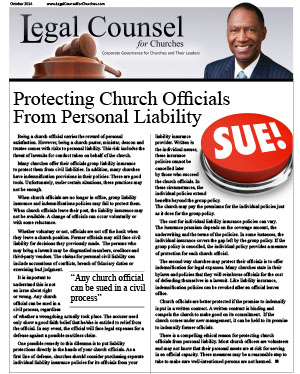Being a church official carries the reward of personal satisfaction. However, being a church pastor, minister, deacon and trustee comes with risks to personal liability. This risk includes the threat of lawsuits for conduct taken on behalf of the church.
Many churches offer their officials group liability insurance to protect them from civil liabilities. In addition, many churches have indemnification provisions in their policies. These are good tools. Unfortunately, under certain situations, these practices may not be enough.
When church officials are no longer in office, group liability insurance and indemnifications policies may fail to protect them. When church officials leave their post, the liability insurance may not be available. A change of officials can occur voluntarily or with some reluctance.
Whether voluntary or not, officials are not off the hook when they leave a church position. Former officials may still face civil liability for decisions they previously made. The persons who may bring a lawsuit may be disgruntled members, creditors and third-party vendors. The claims for personal civil liability can include accusations of conflicts, breach of fiduciary duties or exercising bad judgment.
It is important to understand this is not an issue about right or wrong. Any church official can be sued in a civil process, regardless of whether a wrongdoing actually took place. The accuser need only show a good faith belief that he/she is entitled to relief from the official. In any event, the official will face legal expenses for a defense against a possible meritless claim.
One possible remedy to this dilemma is to put liability protections directly in the hands of your church officials. As a first line of defense, churches should consider purchasing separate individual liability insurance policies for its officials from your liability insurance provider. Written in the individual names, these insurance policies cannot be cancelled later by those who succeed the church officials. In these circumstances, the individual policies extend benefits beyond the group policy. The church may pay the premiums for the individual policies just as it does for the group policy.
The cost for individual liability insurance policies can vary. The insurance premium depends on the coverage amount, the underwriting and the terms of the policies. In some instances, the individual insurance covers the gap left by the group policy. If the group policy is cancelled, the individual policy provides a measure of protection for each church official.
The second way churches may protect their officials is to offer indemnification for legal expenses. Many churches state in their bylaws and policies that they will reimburse officials for the cost of defending themselves in a lawsuit. Like liability insurance, indemnification policies can be revoked after an official leaves office.
Church officials are better protected if the promise to indemnify is put in a written contract. A written contract is binding and compels the church to make good on its commitment. If the church comes under new management, it can be held to its promise to indemnify former officials.
There is a compelling ethical reason for protecting church officials from personal liability. Most church officers are volunteers and may not know that their personal assets are at risk for serving in an official capacity. These measures may be a reasonable step to take to make sure well-intentioned persons are not harmed.

